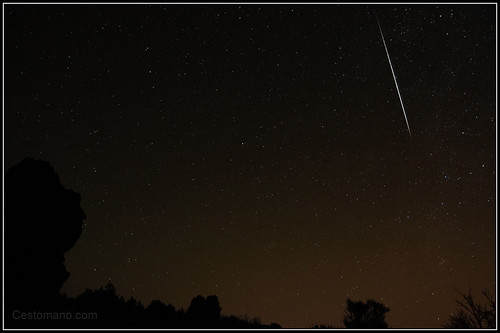 August has been recorded as a peak date for meteor showers for centuries. Tiny grains of sand entering the Earth's atmosphere glow so brightly, they look like falling stars. The Perseid meteor shower is already going, and peaks around August 12. Get out there and take a look. Maybe even make a wish.
August has been recorded as a peak date for meteor showers for centuries. Tiny grains of sand entering the Earth's atmosphere glow so brightly, they look like falling stars. The Perseid meteor shower is already going, and peaks around August 12. Get out there and take a look. Maybe even make a wish.The darker it is when (and where) you're looking for falling stars, the more you should see. If you can, go somewhere away from artificial light sources. Your best bet in DC is probably Rock Creek Park; the Capital Astronomers like to use the field just south of the intersection of Military and Glover Roads NW, near the Nature Center (they'll be out there with their telescopes the evening of August 22). But on a good night, you may be able to see things from your backyard or rooftop, if you can turn off or block out any nearby lights.
Also avoid natural light sources. The sun sets around 8:00 PM, but it starts getting truly dark around 9:00 PM. But the moon is just past full tonight; it will rise around sunset and will create enough light to make it hard to see meteors. Each night over the next week, the moon will get smaller and rise later. Starting on Sunday, there should be several days right around the peak of the Perseids with nice, dark windows of opportunity in the evening:
Sunday, August 9 - 9 PM to 9:30 PM
Monday, August 10 - 9 PM to 10:00 PM
Tuesday, August 11 - 9 PM to 10:30 PM
Wednesday, August 12 - 9 PM to 11:00 PM
Thursday, August 13 - 9 PM to 11:45 PM
Friday, August 14 - 9 PM to 12:30 AM
Saturday, August 15 - 9 PM to 1:30 AM
Sunday, August 16 - 9 PM to 2:45 AM
 The final thing you'll have to consider is the weather report. Clouds, obviously, will make it much harder to see the meteors. But so will humidity, which creates a haze that makes it harder to make out anything in the sky. Perhaps we'll have some more of the nice, low-humidity weather we've been having this summer at some point during this window.
The final thing you'll have to consider is the weather report. Clouds, obviously, will make it much harder to see the meteors. But so will humidity, which creates a haze that makes it harder to make out anything in the sky. Perhaps we'll have some more of the nice, low-humidity weather we've been having this summer at some point during this window.Like the photos in this post? Mouse over for credits; a click takes you to the photographer on Flickr.


